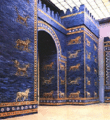Counsels of Wisdom
Counsels of Wisdom is a piece of Babylonian wisdom literature written in Akkadian[1] containing moral exhortations.[2] It is composed primarily of two-line units,[3] without sections.[4] A translation of extant portions of the text was published in Lambert 1996. Existing manuscripts are fragmentary, but the original was estimated to be about 160 lines.[2]
Date of authorship[edit]
Scholars disagree on the date of the work. Gemser and Bohl placed it in the First Dynasty,[5] but Lambert believes it should be dated to the Kassite period.[6] The work is attested primarily by a stone tablet written in Late Babylonian script.[6]
Comparison with other wisdom literature[edit]
The text is addressed to "my son", which may be a physical son, a student, a successor, or a trope of the genre, as it is in later wisdom literature.[2] Scholars have observed several pieces of ancient wisdom literature to be similar, including the Instructions of Shuruppak, Counsels of a Pessimist, and the Hymn to Šamaš (See Shamash). Together these works were an ancient genre.[6] Similarities have been noticed with the Book of Proverbs, but no literary dependence has been found.[7] The Counsels of Wisdom is believed to have been somewhat popular in its time, since fragments of this passage are quoted in other extant works.[2]
Kindness to Evildoers[edit]
Biblical scholar John Nolland sees a passage in the Counsels of Wisdom as a possible precursor to Jesus' command to "love your enemies": "Do not return evil to the man who disputes with you; requite with kindness your evil-doer... smile on your adversary."[8]
See also[edit]
Notes[edit]
- ^ Kitchen 1977, p. 114.
- ^ a b c d Lambert 1996, p. 96.
- ^ Kitchen 1977, p. 88.
- ^ Kitchen 1977, p. 86.
- ^ Jaarbericht Ex Oriente Lux. VIII (670).
{{cite journal}}: Missing or empty|title=(help) - ^ a b c Lambert 1996, p. 97.
- ^ Whybray, R.N. (2009). Wisdom in Proverbs: The Concept of Wisdom in Proverbs 1-9. Studies in Biblical Theology, First Series. Wipf & Stock Publishers. p. 51. ISBN 978-1-60899-019-1. Retrieved 16 April 2017.
- ^ Nolland, John. The Gospel of Matthew: a commentary on the Greek text. Wm. B. Eerdmans Publishing, 2005 pg. 267
References[edit]
- Barré, Michael L. (1981). ""Fear of God" and the World View of Wisdom". Biblical Theology Bulletin. 11 (2). SAGE Publications: 41–43. doi:10.1177/014610798101100203. S2CID 170183050.
- Kitchen, Kenneth A. (1977). "Proverbs and wisdom books of the ancient Near East: the factual history of a literary form" (PDF). Tyndale Bulletin. 28: 69–114. doi:10.53751/001c.30617. Archived from the original (PDF) on 18 May 2012. Retrieved 16 April 2017.
- Lambert, Wilfred G. (1996). Babylonian Wisdom Literature. Eisenbrauns. p. 96–107. ISBN 978-0-931464-94-2. Retrieved 16 April 2017.
External links[edit]
- II.3 Counsels of Wisdom Critical edition and translation of the text (electronic Babylonian Library).
- Counsels of Wisdom (SAT translation).

